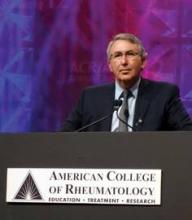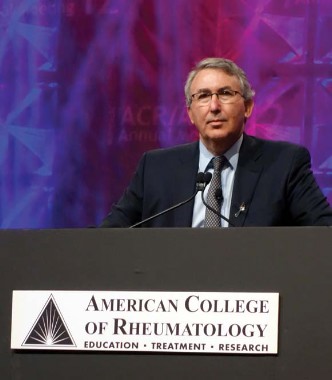User login
WASHINGTON – Autoantibody seronegativity may be the best predictor of which patients will achieve remission in rheumatoid arthritis, but the question of whether and when to withdraw treatment still looms.
"Drug-free remission is possible. Sustained remission is less common," Dr. Stanley Cohen said at the annual meeting of the American College of Rheumatology. "But certainly seronegativity seems to be a strong predictor of the likelihood of sustained remission."
First, Dr. Cohen of Metroplex Clinical Research Center, Dallas, cited several "prebiologic era" studies, including one 1996 randomized controlled trial of 285 patients who stopped nonbiological disease-modifying antirheumatic drug (DMARD) therapy after achieving the "quite stringent" 1981 ACR/ARA remission definitions for 1 year.
In that study, after the year of remission, patients were randomized to either placebo or to continue their treatment regimen: by 52 weeks, 38% of the placebo group had flared, compared with 22% of the continued therapy group (P = .002) (Lancet 1996;347:347-52).
The authors then looked at the predictors of maintaining remission.
"They determined that having rheumatoid factor activity [there were no CCP (cyclic citrullinated peptide) antibodies at that time] was a poor prognostic factor for maintaining remission," said Dr. Cohen.
"More aggressive treatment prior to remission also boded poorly for maintaining that remission," he noted.
A similar finding was seen with the Leiden Early Arthritis Clinic trial of 454 patients and the British Early Rheumatoid Arthritis Study (ERAS) of 895 patients, both reviewed in 2009.
Sustained drug-free remission was seen in 15% of the former cohort and in 9% in the latter. The absences of CCP autoantibodies and rheumatoid factor were the sole two independent predictors of remission in multivariate analysis (Arthritis Rheum. 2009;60:2262-71).
Having early disease also plays a role in the ability to withdraw treatment, Dr. Cohen said. He pointed to the COMET trial (Combination of Methotrexate and Etanercept in Active Early Rheumatoid Arthritis), which looked at etanercept plus methotrexate versus methotrexate alone in moderate-to-severe rheumatoid arthritis for a duration of 3-24 months.
"What I’m interested in is year 2," Dr. Cohen said, when 111 patients who were on methotrexate plus etanercept in year 1 stopped methotrexate (Arthritis Rheum. 2010;62:674-82).
"Compared to the group that continued etanercept plus methotrexate, the majority continued to be in DAS28 remission without methotrexate" at 2 years, he said. "So, in patients with very early disease, it looks like we can withdraw or simplify the therapy in a significant number of those patients."
Treatment withdrawal, however, also can be achieved in patients with more longstanding disease.
Dr. Cohen cited a 2003 long-term extension of a clinical registration trial in which 79 patients with very long and very severe disease (mean duration of disease, 14 years) received etanercept and methotrexate for a median of 44 months (Arthritis Rheum. 2003;48:1493-9).
Among the 36 patients assessed at 3 years, 30 (83%) were able to decrease their dosages of corticosteroids and 20 (56%) could stop corticosteroids altogether.
"This certainly follows what we see in the clinic, in that we can frequently lower our doses of corticosteroids or withdraw them," Dr. Cohen said.
"What about methotrexate?" he asked. At 3 years, the dosage of methotrexate was decreased in 41 of 66 patients (62%), and methotrexate therapy was discontinued in 19 patients (29%).
"We try to wean our therapy in the majority of these patients," said Dr. Cohen. "Some are successful, some are not."
Dr. Cohen stated that he had no disclosures related to this presentation; he previously disclosed relationships with Abbott Laboratories, Amgen, Astellas, Bristol-Myers Squibb, Janssen, Pfizer, and Roche.
WASHINGTON – Autoantibody seronegativity may be the best predictor of which patients will achieve remission in rheumatoid arthritis, but the question of whether and when to withdraw treatment still looms.
"Drug-free remission is possible. Sustained remission is less common," Dr. Stanley Cohen said at the annual meeting of the American College of Rheumatology. "But certainly seronegativity seems to be a strong predictor of the likelihood of sustained remission."
First, Dr. Cohen of Metroplex Clinical Research Center, Dallas, cited several "prebiologic era" studies, including one 1996 randomized controlled trial of 285 patients who stopped nonbiological disease-modifying antirheumatic drug (DMARD) therapy after achieving the "quite stringent" 1981 ACR/ARA remission definitions for 1 year.
In that study, after the year of remission, patients were randomized to either placebo or to continue their treatment regimen: by 52 weeks, 38% of the placebo group had flared, compared with 22% of the continued therapy group (P = .002) (Lancet 1996;347:347-52).
The authors then looked at the predictors of maintaining remission.
"They determined that having rheumatoid factor activity [there were no CCP (cyclic citrullinated peptide) antibodies at that time] was a poor prognostic factor for maintaining remission," said Dr. Cohen.
"More aggressive treatment prior to remission also boded poorly for maintaining that remission," he noted.
A similar finding was seen with the Leiden Early Arthritis Clinic trial of 454 patients and the British Early Rheumatoid Arthritis Study (ERAS) of 895 patients, both reviewed in 2009.
Sustained drug-free remission was seen in 15% of the former cohort and in 9% in the latter. The absences of CCP autoantibodies and rheumatoid factor were the sole two independent predictors of remission in multivariate analysis (Arthritis Rheum. 2009;60:2262-71).
Having early disease also plays a role in the ability to withdraw treatment, Dr. Cohen said. He pointed to the COMET trial (Combination of Methotrexate and Etanercept in Active Early Rheumatoid Arthritis), which looked at etanercept plus methotrexate versus methotrexate alone in moderate-to-severe rheumatoid arthritis for a duration of 3-24 months.
"What I’m interested in is year 2," Dr. Cohen said, when 111 patients who were on methotrexate plus etanercept in year 1 stopped methotrexate (Arthritis Rheum. 2010;62:674-82).
"Compared to the group that continued etanercept plus methotrexate, the majority continued to be in DAS28 remission without methotrexate" at 2 years, he said. "So, in patients with very early disease, it looks like we can withdraw or simplify the therapy in a significant number of those patients."
Treatment withdrawal, however, also can be achieved in patients with more longstanding disease.
Dr. Cohen cited a 2003 long-term extension of a clinical registration trial in which 79 patients with very long and very severe disease (mean duration of disease, 14 years) received etanercept and methotrexate for a median of 44 months (Arthritis Rheum. 2003;48:1493-9).
Among the 36 patients assessed at 3 years, 30 (83%) were able to decrease their dosages of corticosteroids and 20 (56%) could stop corticosteroids altogether.
"This certainly follows what we see in the clinic, in that we can frequently lower our doses of corticosteroids or withdraw them," Dr. Cohen said.
"What about methotrexate?" he asked. At 3 years, the dosage of methotrexate was decreased in 41 of 66 patients (62%), and methotrexate therapy was discontinued in 19 patients (29%).
"We try to wean our therapy in the majority of these patients," said Dr. Cohen. "Some are successful, some are not."
Dr. Cohen stated that he had no disclosures related to this presentation; he previously disclosed relationships with Abbott Laboratories, Amgen, Astellas, Bristol-Myers Squibb, Janssen, Pfizer, and Roche.
WASHINGTON – Autoantibody seronegativity may be the best predictor of which patients will achieve remission in rheumatoid arthritis, but the question of whether and when to withdraw treatment still looms.
"Drug-free remission is possible. Sustained remission is less common," Dr. Stanley Cohen said at the annual meeting of the American College of Rheumatology. "But certainly seronegativity seems to be a strong predictor of the likelihood of sustained remission."
First, Dr. Cohen of Metroplex Clinical Research Center, Dallas, cited several "prebiologic era" studies, including one 1996 randomized controlled trial of 285 patients who stopped nonbiological disease-modifying antirheumatic drug (DMARD) therapy after achieving the "quite stringent" 1981 ACR/ARA remission definitions for 1 year.
In that study, after the year of remission, patients were randomized to either placebo or to continue their treatment regimen: by 52 weeks, 38% of the placebo group had flared, compared with 22% of the continued therapy group (P = .002) (Lancet 1996;347:347-52).
The authors then looked at the predictors of maintaining remission.
"They determined that having rheumatoid factor activity [there were no CCP (cyclic citrullinated peptide) antibodies at that time] was a poor prognostic factor for maintaining remission," said Dr. Cohen.
"More aggressive treatment prior to remission also boded poorly for maintaining that remission," he noted.
A similar finding was seen with the Leiden Early Arthritis Clinic trial of 454 patients and the British Early Rheumatoid Arthritis Study (ERAS) of 895 patients, both reviewed in 2009.
Sustained drug-free remission was seen in 15% of the former cohort and in 9% in the latter. The absences of CCP autoantibodies and rheumatoid factor were the sole two independent predictors of remission in multivariate analysis (Arthritis Rheum. 2009;60:2262-71).
Having early disease also plays a role in the ability to withdraw treatment, Dr. Cohen said. He pointed to the COMET trial (Combination of Methotrexate and Etanercept in Active Early Rheumatoid Arthritis), which looked at etanercept plus methotrexate versus methotrexate alone in moderate-to-severe rheumatoid arthritis for a duration of 3-24 months.
"What I’m interested in is year 2," Dr. Cohen said, when 111 patients who were on methotrexate plus etanercept in year 1 stopped methotrexate (Arthritis Rheum. 2010;62:674-82).
"Compared to the group that continued etanercept plus methotrexate, the majority continued to be in DAS28 remission without methotrexate" at 2 years, he said. "So, in patients with very early disease, it looks like we can withdraw or simplify the therapy in a significant number of those patients."
Treatment withdrawal, however, also can be achieved in patients with more longstanding disease.
Dr. Cohen cited a 2003 long-term extension of a clinical registration trial in which 79 patients with very long and very severe disease (mean duration of disease, 14 years) received etanercept and methotrexate for a median of 44 months (Arthritis Rheum. 2003;48:1493-9).
Among the 36 patients assessed at 3 years, 30 (83%) were able to decrease their dosages of corticosteroids and 20 (56%) could stop corticosteroids altogether.
"This certainly follows what we see in the clinic, in that we can frequently lower our doses of corticosteroids or withdraw them," Dr. Cohen said.
"What about methotrexate?" he asked. At 3 years, the dosage of methotrexate was decreased in 41 of 66 patients (62%), and methotrexate therapy was discontinued in 19 patients (29%).
"We try to wean our therapy in the majority of these patients," said Dr. Cohen. "Some are successful, some are not."
Dr. Cohen stated that he had no disclosures related to this presentation; he previously disclosed relationships with Abbott Laboratories, Amgen, Astellas, Bristol-Myers Squibb, Janssen, Pfizer, and Roche.
EXPERT ANALYSIS FROM THE ANNUAL MEETING OF THE AMERICAN COLLEGE OF RHEUMATOLOGY

